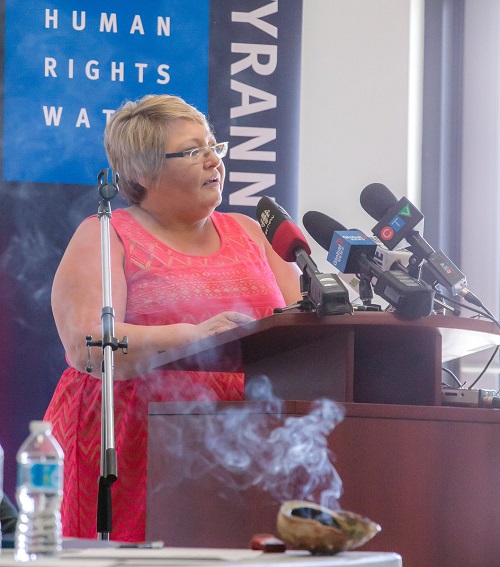FSIN Vice-Chief Heather Bear, photo courtesy @fsinations, Twitter.
A group called “Human Rights Watch” flanked by FSIN Vice-Chief Heather Bear, released a report outlining alleged abuse and discrimination against Aboriginal women and girls by police forces in the province and right across Canada.
The group is calling for the establishment of an independent civilian committee to investigate complaints against police.
The report cites several examples of abuse, as well as intimidation. Human Rights Watch says it documented 64 alleged cases of violent abuse against Indigenous women at the hands of the police.
The abuse documented included excessive use of force, invasive body and strip searches by male officers and sexual harassment during these searches. The report was compiled last year during a six-week fact finding mission by Human Rights Watch researchers.
Bear says the FSIN stands behind the report.
“Policing is one of the institutions that has failed to protect Indigenous women from violence, so how many reports do we have to do to before this issue is addressed properly?”
The report calls for an independent civilian committee to look into complaints against the police, which Bear says is important because when it comes to Aboriginal women and girls she says the issues are unique.
“We need someone to watch who is protecting us and ensure that accountability is there to protect and serve the citizens of the province.”
The group is calling on the federal and provincial government to expand non-incarceration options for individuals arrested for being intoxicated in public, including short and long-term detox facilities, and alcohol management programs, where medical and social services personnel can provide appropriate care in a culturally sensitive way.
It also wants police forces to step up their training of officers to include cultural sensitivity and indigenous history. It is also asking police agencies to document ethnicity of people they come in contact with to provide better record keeping on how the law interacts with Indigenous people.
Bear says there are good officers in the RCMP and city police forces and more are needed to protect not only Indigenous women but all women. She also says there is still mistrust within Aboriginal people and the police.
“There are a lot of people out there that don’t want to come forward about this issue because they fear retaliation or negative repercussions if they spoke out. There’s an element of fear and intimidation and that is what the police are supposed to be defending and protecting.”
